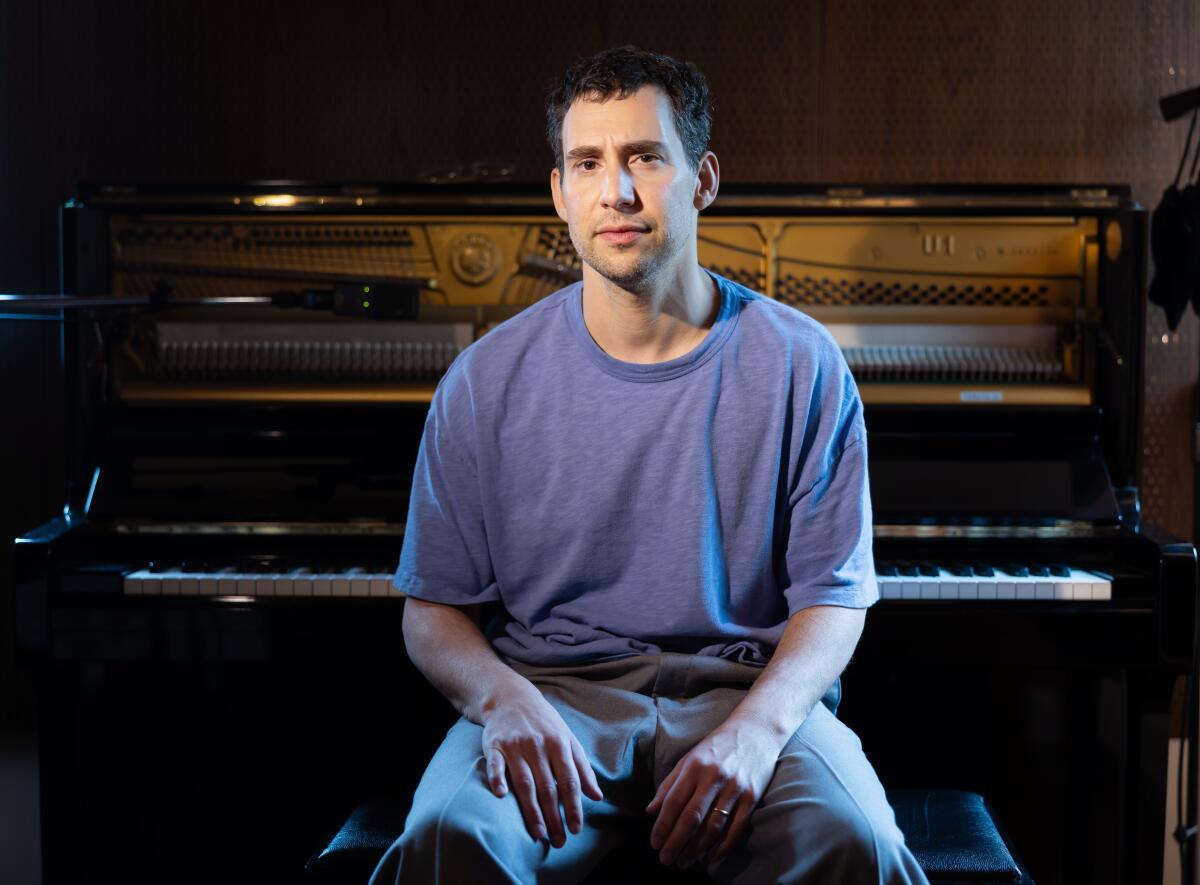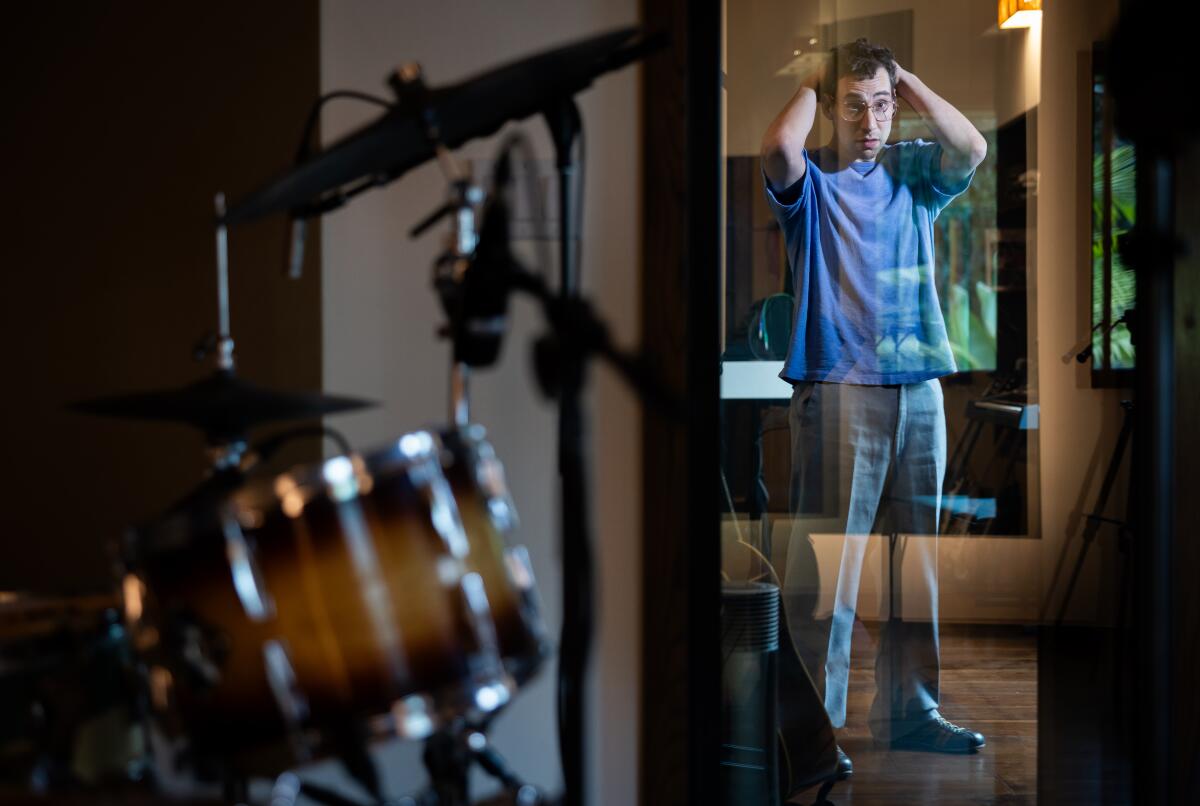“I hate this weather,” he says as he peers through a soundproofed window he claims would keep us from hearing two cars smashing into each other right out front. “I’m really basic when it comes to weather: I like sun and warmth, and anything besides that causes me dissonance.”
What Antonoff doesn’t know at the moment is that at the Grammys he’ll win album of the year for his work as a producer and songwriter on Taylor Swift’s chart-topping “Midnights” and be named producer of the year for the third time in a row. The latter achievement will tie a record set in the mid-1990s by Kenny “Babyface” Edmonds, the groundbreaking R&B auteur whose Tiny Desk Concert is a favorite of Antonoff’s.
“I was just watching him do ‘Change the World,’” he says, referring to the rootsy-soulful Eric Clapton hit produced by Babyface. “Crazy song, man.”
What Antonoff does know ahead of the Grammys — knows but can’t talk about as we hide out from the rain — is that he’s already completed another LP with Swift: “The Tortured Poets Department,” which she’ll reveal onstage during the ceremony in a surprise announcement that promptly breaks the internet. Due April 19, it’s the seventh studio album Swift and Antonoff have made together over the last decade (not counting her blockbuster re-recordings of her early work); it’s also sure to extend his reign as perhaps the most in-demand producer in pop music: a technical whiz with a knack for ear-grabbing sounds and a born co-conspirator capable of making artists feel safe.
Among the albums he’s helped shepherd to varying combinations of commercial success, critical acclaim and awards attention are Lorde’s “Melodrama” and “Solar Power,” St. Vincent’s “Masseduction,” Clairo’s “Sling,” Florence and the Machine’s “Dance Fever,” the 1975’s “Being Funny in a Foreign Language” and Lana Del Rey’s “Norman F—ing Rockwell!” and “Did You Know That There’s a Tunnel Under Ocean Blvd,” both of which earned Grammy nods for album of the year. Each has its own quirks, yet all of them can make the intimate feel anthemic and vice versa.
“He’s a genius,” says Natalie Maines of the Chicks, who drafted Antonoff to helm their 2020 comeback disc, “Gaslighter.” “Every day I couldn’t wait to be in the studio with him.” She laughs. “He better work with us again, or I’ll quit.”

Jack Antonoff, right, and Taylor Swift with the members of Boygenius backstage at the 66th Grammy Awards in February.
For now Antonoff, 39, is funneling his talent into “Bleachers,” a self-titled album by the New Jersey-based rock group he formed in 2013, shortly before his contributions to Swift’s nine-times-platinum “1989” set him on a path toward pop ubiquity. In the beginning, Bleachers was a vehicle for the neo-New Wave noodling Antonoff would do by himself on his laptop; later, he convened a handful of musicians — including two sax players — and the band became known as a fist-pumping, sweat-spraying, Springsteen-channeling live act. (“Chinatown,” a track from 2021’s “Take the Sadness Out of Saturday Night,” featured the Boss himself.)
ADVERTISEMENT
This latest record, the band’s fourth full-length, presents a further evolution: Though the album’s lead single, “Modern Girl,” has a rowdy E Street vibe, the rest of the LP is lusher and more nuanced, with spacious arrangements that blend strummy acoustic folk, tender soft rock and glimmering ’80s R&B.

“To me it feels massively different,” Antonoff says in his studio, which wraps around a small garden designed by the same folks who maintain the grounds of Conway Recording Studios, his favorite place to work in Los Angeles until he got this spot up and running late last year. Decorated in cozy earth tones and lined with banks of vintage synthesizers, the room is new enough that he asks visitors to take off their shoes — “We’re still treating it like a house,” he says — and takes clear pleasure in showing off the pictures and knickknacks on the shelves: a shot of his dad and his uncle in the ’70s, a drawing by the late Daniel Johnston, a framed piece of hotel stationery scrawled with an initial sequencing idea for “Norman F—ing Rockwell!”
A Polaroid of a pair of cowboy boots — Del Rey’s, it turns out — lies on a coffee table, one product of Antonoff’s effort to start taking more old-school photos. “The phone kind of ruined pictures,” he says. “If I point a camera at you, you’re like, ‘Picture!’ If I point this at you,” he adds, lifting his phone, “you’re like, ‘Am I gonna be canceled?’”
Jamie Oborne, who manages Antonoff’s career and heads up the band’s record label, Dirty Hit, says that “Bleachers” marks “the first time Jack’s done for himself what he does for so many other people when he produces records.” And there might be something to that in the careful way he frames his singing, selecting just the right textures to draw out the rich emotion in his voice. Yet it’s not merely the sound of “Bleachers” that distinguishes the album but Antonoff’s newly expansive approach to writing for the band.
The first few Bleachers records, he says today, were almost entirely defined by his experience of grief, which began when his younger sister, Sarah, died of brain cancer when she was 13 and Antonoff was 18. He wrote about her memory and about survivor’s guilt and about what happens as you get further away from trauma but still can’t shake it — “the long COVID of survivor’s guilt,” as he puts it.
“Bleachers” takes a wider view in songs that ponder the absurdities of pop culture and the renewing power of romance; Antonoff attributes the latter, as heard in songs like “Tiny Moves” and “Me Before You,” to his falling in love with the actor Margaret Qualley, whom he married last year in a star-studded wedding not far from where the couple live much of the year in New Jersey.
Was there a part of him that felt like addressing other themes in his music constituted a betrayal of his sister?
“Yeah, and I fought against that,” he says, pulling his knees toward his chest on the couch. “I don’t think the highest version of keeping someone’s memory alive is not living, you know?” Antonoff says that for years the enormity of Sarah’s death led him to conclude that anything going wrong in his life — anger, anxiety, panic attacks — was a result of that tragedy. “And that’s an almost impossible thing to realize isn’t true,” he says. The depth of his connection with Qualley helped open his mind.

Jack Antonoff in his Hollywood recording studio.
(Christina House/Los Angeles Times)
“Now I can finally prosecute the 20 years of things that I just swept under the rug of loss,” he says with a laugh. “I feel liberated by starting to take some of my things to the Container Store in my head.”
Antonoff grew up comfortably in New Jersey — his older sister, Rachel, is now a fashion designer — and played in a series of bands in high school and afterward; one of the groups, Steel Train, had a song inspired by his then-girlfriend, Scarlett Johansson. In 2008, he formed a trio called Fun., which went on to score with “We Are Young,” a major radio hit in 2012 that won a Grammy for song of the year; around the same time, he began a five-year relationship with the filmmaker Lena Dunham, which invited his first brush with tabloid celebrity.
Antonoff’s decision not to live full-time these days in L.A. could be seen as a rejection of that kind of fame. He insists it comes down to the inspiration he still pulls from New York and New Jersey — and to the fact that his skin gets too dry if he’s here longer than a few weeks. But he admits that L.A.’s highly competitive pop industry, in which songwriters and producers “are expected to fly into all these rooms and mine the deepest parts of their soul, then throw it out there and go to the next one,” is “kind of bulls—.”
“It’s not how good things are made,” he continues. “Great things are made by a small group of people yes-anding each other all the way to the moon.” It’s an anti-song-factory approach that’s been embraced in Antonoff’s wake by Billie Eilish and her producer-slash-brother, Finneas O’Connell, and by Olivia Rodrigo and her producer, Dan Nigro.
Says Monte Lipman, founder and chief executive of Republic Records, which puts out Swift’s work: “What makes Jack so unique is that he’s never gravitated toward pop music — pop music simply gravitated toward Jack.”
Antonoff thinks of Bleachers’ records and those he makes for his production clients as part of the same fabric; the music reflects his belief that “we’ve reached an interesting moment where it doesn’t feel like there’s many more inventions” — at least compared to the boom in digital recording technology he witnessed when he was younger — “so the most exciting thing you can do is take classic instruments and make them sound like they never sounded.” Mikey Freedom Hart, who plays guitar and keyboards in Bleachers and has appeared all over Swift’s and Del Rey’s albums, says the musicians in Antonoff’s circle like to imagine themselves as a modern-day version of the tight-knit Wrecking Crew of session players who fueled countless pop hits in the ’60s and ’70s.

Bleachers performs at the Kia Forum in 2022.
(Dania Maxwell/Los Angeles Times)
The closeness Antonoff feels with his collaborators has cultivated a protective streak that emerges occasionally on social media, where he’s been known to post a salty comment, as when he described Damon Albarn of Blur and Gorillaz as a “herb” after Albarn suggested in an interview with The Times that Swift doesn’t write her own songs.
“I’m a little bitch sometimes,” he allows. “But you come after my friend Taylor, you’re toast to me.” Questioning Swift’s songwriting, he adds, “is like challenging someone’s faith in God. You just don’t go there.” He’s had harsh words for another of Swift’s antagonizers, Kanye West, whom he says “just needs his diaper changed so badly.”
Does he ever think twice about roasting a well-known musician he might someday want to work with?
“It’s been a long time since I would’ve taken Kanye’s call,” he says with a laugh. “I’m so incredibly bored when someone doesn’t have the sauce anymore, so they go elsewhere to shock. It’s just a remarkable waste of space.”

Says the Chicks’ Natalie Maines of Jack Antonoff: “He’s a genius.”
(Christina House/Los Angeles Times)
Asked whose call he’d be more inclined to take, Antonoff says he doesn’t have “a road map in my head for what I will or won’t do.” He decides whether a potential collaboration is right based on a simple reaction: “Am I excited or not?”
Beyond Swift’s “Tortured Poets Department,” about which he stays mum in a phone conversation after the Grammys, he’s working on Del Rey’s next LP, which she’s said will be a country album titled “Lasso.” “We’ve been cooking,” he says. “It’s f—ing brilliant.” (Of the current country craze that’s also drawn Beyoncé and Post Malone toward the genre, Antonoff says, “The bubbling is about to blow — I feel it everywhere.”)
Bleachers will also tour this year, including a stop at April’s Coachella festival, and though he’s not at all sure how the band will configure the new album’s quieter, more intricate moments for the stage, he says he finds the task more exciting than worrying. Ditto the prospect of turning 40, which he’ll do at the end of March. Pop music is often thought of as a young person’s game, but Antonoff dismisses that notion.
“To me, you express your age the way you express it. Look at Bob Dylan: ‘Rough and Rowdy Ways’ felt so bitchy and cool,” he says of Dylan’s 2020 album, “whereas when he was young he was being such a little poet.” Antonoff wants to have children with Qualley, but he knows the demands of parenthood will fundamentally alter the life he’s built in music.
“I see that as the next big shake-up,” he says. “The first time in a while I’ll be doing something I have no idea how to do.”





